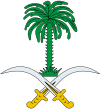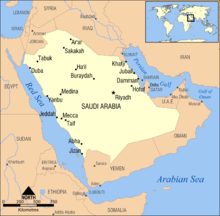- Nuclear program of Saudi Arabia
-
Weapons of
mass destruction
By type Biological, Chemical, Nuclear, Radiological By country Proliferation Biological, Chemical, Nuclear, Missiles Treaties List of treaties  Book ·
Book ·  Category
CategorySaudi Arabia is not known to have a nuclear weapons program. From an official and public standpoint, Saudi Arabia has been an opponent of nuclear weapons in the Middle East, having signed the Nuclear Non-Proliferation Treaty, and is a member of the coalition of countries demanding a Nuclear-Weapon-Free Zone in the Middle East.[1][2] Studies of nuclear proliferation have not identified Saudi Arabia as a country of concern.[3]
However, over the years there have been media reports of Saudi Arabia's intent to purchase a nuclear weapon from an outside source. In 2003, a leaked strategy paper laid out three possible options for the Saudi government: to acquire a nuclear deterrent, to ally with and become protected by an existing nuclear nation, or to try to reach agreement on having a nuclear-free Middle East. UN officials and weapon specialists have suggested this review was prompted by a distancing of relations with the US, concerns over Iran's nuclear program, and the lack of international pressure on Israel to give up its nuclear weapons.[4]
Contents
U.S. involvement
In May 2008, the United States and Saudi Arabia signed a memorandum of understanding to boost Saudi efforts for a civilian nuclear energy program.[5]
Saudi Arabia and Iraq's nuclear weapon program
In 1994, Muhammad Khilewi, the second-in-command of the Saudi mission to the United Nations, applied for asylum in the United States. He provided a packet of 10,000 documents[citation needed] that alleged long time Saudi support of the Iraqi nuclear weapons program. According to these documents, during the Saddam Hussein regime in Iraq, the Saudis supported the Iraqi nuclear program with $5 billion on the condition that successful nuclear technology and possibly even nuclear weapons would be transferred to Saudi Arabia.[6] Khilewi obtained asylum in the US, with the consent of Saudi Arabia. The allegations have not been confirmed by any other source, and US officials have stated that they have no evidence of Saudi assistance to Iraqi nuclear development.[7] Saudi officials denied the allegations.[8]
Furthermore, senior Clinton administration officials who were responsible for Mideast affairs at the time Khilewi sought asylum, including Robert Pelletreau of the State Department and Bruce Riedel of the National Security Council, said they found nothing in Khilewi's debriefings to back up the Media reports about a Saudi nuclear program. "There was nothing there," Pelletreau said. (Vartan 2005)
Saudi Arabia-Pakistan nuclear deal
In 2003 it was reported that Pakistan and Saudi Arabia had entered a secret agreement on "nuclear cooperation" providing Saudi Arabia with nuclear weapons technology in return for access to cheap oil for Pakistan.[9]
In March 2006, the German magazine Cicero reported that Saudi Arabia had since 2003 received assistance from Pakistan to acquire nuclear missiles and warheads. Satellite photos allegedly reveal an underground city and nuclear silos with Ghauri rockets in Al-Sulaiyil, south of the capital Riyadh.[10] Pakistan has denied aiding Saudi Arabia in any nuclear ambitions.[11]
Saudi Arabia and the Arab states of the Persian Gulf nuclear programs
Furthermore, the Arab states of the Persian Gulf plan to start their own joint civilian nuclear program, which has raised fears of proliferation.[citation needed] In March 2007, foreign ministers of the six-member Gulf Cooperation Council met in Saudi Arabia to discuss progress in plans agreed in December 2006, for a joint civilian nuclear program.[12]
Missile capability
In 1987 it was reported that Saudi Arabia purchased between 50 and 60 Chinese-made CSS-2 intermediate-range ballistic missiles equipped with a high explosive warhead, which have a range of 2,800 km with a payload of either 2,150 or 2,500 kg together with between 10 and 15 transport vehicle systems.[13]
References
- ^ Parties to the NPT
- ^ Akaki Dvali. Center for Nonproliferation Studies (nti.org) (March 2004). Will Saudi Arabia Acquire Nuclear Weapons?; Arnaud de Borchgrave. Washington Times (October 22, 2003)
- ^ Office of Technology Assessment (OTA), US Congress, Technologies Underlying Weapons of Mass Destruction (Washington, DC: US Government Printing Office, 12/93), p. 239
- ^ The Guardian (September 18, 2003). Saudis consider nuclear bomb
- ^ reportonbusiness.com: Purchase this article
- ^ Saudi Arabia Special Weapons
- ^ http://cns.miis.edu/research/wmdme/saudi.htm#1 Weapons of Mass Destruction in the Middle East, James Martin Center for Nonproliferation Studies
- ^ Akaki Dvali. Center for Nonproliferation Studies (nti.org) (March 2004). Will Saudi Arabia Acquire Nuclear Weapons?; Arnaud de Borchgrave. Washington Times (October 22, 2003)
- ^ Pakistan, Saudi Arabia in secret nuke pact
- ^ "Saudia [sic] Arabia working on secret nuclear program with Pakistan help– report ", AFX News[1]
- ^ "Pakistan rejects report on N-help to Saudis", Daily Times (Pakistan), (30 March 2006).
- ^ Saudi defends Gulf Arab atom plans, criticizes Iran | International | Reuters
- ^ http://web.archive.org/web/20080524155801/http://www.missilethreat.com/missilesoftheworld/id.3/missile_detail.asp
 Saudi Arabia topics
Saudi Arabia topics- Index
- Outline
History 
Geography Law Politics - King
- Cabinet
- Allegiance Council
- National Security Council
- Consultative Assembly
- Foreign relations
- Nuclear program
- Mabahith (secret police)
Military Economy Society Culture Symbols Categories:- Economy of Saudi Arabia
- Energy in Saudi Arabia
- Nuclear technology in Saudi Arabia
- Politics of Saudi Arabia
- Government of Saudi Arabia
- Nuclear weapons programs
- Foreign relations of Saudi Arabia
Wikimedia Foundation. 2010.

